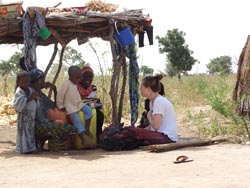The prevalence of malnutrition in terms of stunting and wasting is high in rural Northern Ghana. Agriculture plays an important role in access to food, as agriculture represents the population’s main livelihood activity in the area. Hence, multiple programs (including N2Africa) aim to address malnutrition by increasing agricultural production. The position of women is one of the pathways through which agriculture affects children’s dietary nutrient adequacy and nutritional status, as women tend to prioritize the nutrition and health of their children. An empowered and healthy woman, is better able to control resources needed for good care, in turn stimulating the nutritional status of her children.
|
Froukje studied how the position of mothers is related to dietary nutrient adequacy and nutritional status of children of 6-23 months old. The position of mothers included the health status and different domains of empowerment, like decision-making power, mobility, attitude towards and freedom from domestic violence, socio-economic status, marital characteristics etc. Froukje interviewing female key stakeholders in Ghana (Photo Sofia Argyropoulou, 2015) |
 |
Together with another student Sofia, a translator, guide and driver a total of 51 households were visited. Mothers were interviewed to assess the degree of maternal empowerment regarding different domains. Interviews were held with key stakeholders in the area. Pre-existing data of the quantitative dietary intake study was used to establish child’s dietary diversity, child and maternal nutritional status and maternal socio-economic characteristics. The report can be found here.
Results of the research implicated that different aspects of the position of women seem to relate differently to child nutrition. Whereas some domains do not affect children nutritional outcomes, others seem to benefit or harm children’s diet. FFirst, findings revealed that stunted children (chronically undernourished) are more likely to have mothers who do not experience domestic violence, do not experience physical mobility constraints and are older. In other words, based on these indicators, results imply that empowered women have children with better nutritional status in terms of stunting. Second, findings showed that wasted children (acute undernourished) are more likely to have mothers with an impaired health status i.e. mothers with a better health status have children a better nutritional status in terms of wasting. Therefore it is concluded that policies and interventions need to consider the different impacts of domains of mother’s position on children’s nutritional outcomes and hence be sensitive to the context and culture.
Froukje Takens
Froukje Takens completed her BSc in human nutrition and just received her MSc diploma in Health and Society, with a focus on sociology of consumption and households, at Wageningen University. For her master’s thesis she did fieldwork in Karaga district in Northern Ghana. She re-visited households who have participated in an earlier quantitative dietary intake study conducted by Ilse de Jager and others (see Podcaster 31).
